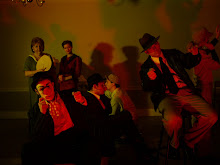Henrik Ibsen married Suzanna Thoreson in 1858, at age 30. His one time friend Martin Scheneekloth saw the marriage as a tragedy. In his letters about Ibsen he wrote:
“To find that one does not really love the woman one has married, that one’s requirements for a happy co-existence are so opposed to one’s wife’s that no reconciliation is possible, must be a desperate situation for a man, and that is Ibsen’s. He is a domineering character, egocentric and unbending, with a passionate masculinity and a curious admixture of personal cowardice, compulsively idealistic yet totally indifferent to expressing these ideals in his daily life… She is unwomanly, tactless, but a stable, hard character, a mixture of intelligence and stupidity, not deficient in feeling but lacking humility and feminine love. They can not find peace through love, so they wage war on each other, ruthlessly coldly, and yet she loves him, if only through their son, their poor son, whose fate is the saddest that could befall any child, to see divided what should be reconciled in him.
Whose is the fault if not the man? He took her from her father’s house, led her out into the strange world, and instead of devoting his life to finding some form of reconciliation he gives all his mind and passion to a demonic pursuit of literary fame. It is disturbing to hear him describe his plans to send his wife and child home so that he may work in peace abroad. He lacks the courage to pursue his career without abandoning his domestic responsibilities, to face up to the consequences of his ambition, to work incessantly to give her life fulfillment, to suffer and strive to educate his son. Thus he, who so loudly and brilliantly condemns the cravenness of our age, who in mighty poems proclaims the strength of human will, is himself a craven vacillating weakling. "
However their son Sigurd painted a very different picture. He saw his mother as Ibsen’s greatest champion who forced him to write in the many time she was tempted to give it all up. “The world can thank my mother that it has one bad painter the fewer and got a great writer instead.”
Henrik stayed with Suzannah till his death in 1906. While she encouraged the publishing of his work, she did her best to burn all his letters to her declaring their correspondence private. The letters that have survived are very affectionate. Ibsen referred to her by pet names such as his “cat” or “eagle.”
In 1914, a few days before her death, she spoke to an interviewer. “When we were young, many so-called friends came to Ibsen, but I sent them away… I had many unkind words for it, but I didn’t care. He had to have peace for his work… Ibsen had no steel in his character- but I gave it to him.”
Most likely glimpses of the truth remain in all his late plays of the joys and the sorrows, while the rest remains a mystery.
Our panel on Ibsen's Women is today, May 10, after the 2pm matinee.
Enemy of the People runs May 4-30, 2009.
Ticket are available through our website.
Paul G. Miller
Season Dramaturge


No comments:
Post a Comment